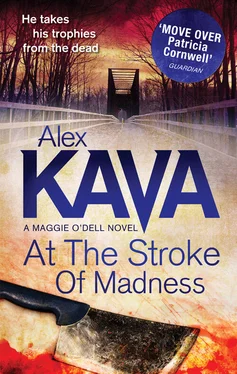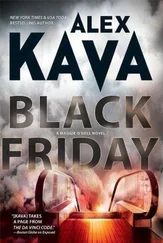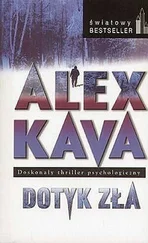“Crap! That was close.”
His hands were fisted, his fingers red and still gripping the steering wheel. But the UPS driver simply waved, full hand, no choice fingers extended, no lips moving to the tune of “fuck you.” Maybe the guy simply hadn’t realized how close Adam had come to plowing into him. He reached over as an afterthought and turned down the volume on the Dixie Chicks. As he did so, he noticed the metal pry bar that had slid out from under the passenger seat.
Adam checked his rearview mirror to make sure he wasn’t holding up traffic, then he leaned down, grabbed the pry bar, slid open the rear window and tossed the tool into the enclosed pickup bed. It clanked against the lining and he cringed, hoping he hadn’t cracked the makeshift shell he’d just installed. It was a tough, waffle-weave polyurethane that was supposed to be easy to clean and would protect the bed from rust and corrosion, no matter how much mud and bones and blood he stuffed back there. It was just another measure he took to keep his pickup from becoming a smelly mobile morgue.
He checked the floor for more tools. He needed to remind his students to put their tools back whenever they borrowed his pickup. Maybe he shouldn’t complain. At least the pry bar was clean. That was a start.
Maggie juggled her briefcase in one hand, a pile of mail under her arm and a can of Diet Pepsi and a rawhide chew bone in the other hand as she followed Harvey out onto their patio. Harvey had convinced her as soon as she walked in the front door that they should spend their first afternoon of vacation in the backyard.
She had only planned on making a brief visit to her office at Quantico to finish up some paperwork. She’d had no intentions of bringing work home with her. Now, as she unloaded the files from her briefcase onto the wrought-iron patio table, she wished she had left these back on her desk, hidden under the stacks where they had been for the last several months.
She watched Harvey, nose to the ground, doing his routine patrol of the fence line. Her huge two-story, brick Tudor house sat on almost two acres, protected by the best electronic security system money could buy, as well as by a natural barrier of pine trees that made it difficult to see even her neighbors’ roofs. Yet the white Labrador went into guard duty every time they stepped out of the house, not able to relax or play until he checked out every inch.
He had been this way ever since Maggie adopted him. Okay, adopted wasn’t quite right. She had rescued him after his owner had been kidnapped and murdered by serial killer Albert Stucky, targeted only because she happened to be Maggie’s new neighbor. Of course, Maggie had rescued poor Harvey. How could she not? And yet, the ironic part was that Harvey had rescued her, too, giving her a reason to come home every evening, teaching her about unconditional love, forgiveness and loyalty. Lessons she had missed out on growing up with an alcoholic, suicidal mother. Important qualities that had also been missing from her marriage to Greg.
Harvey was at her side now, having performed his routine patrol and nudging her hand for his reward. She scratched behind his ears and his big head lolled to the side, leaning against her. She gave him the rawhide chew bone and he pranced off, flopping himself down into the grass, monster paws holding the bone as he chewed while he kept one ear perched, listening, and his eyes on Maggie. She shook her head and smiled. What more could a girl want? Loyalty, affection, admiration and constant protection. And Tully wondered why she was content to have her divorce settlement over with, behind her. In ten years of marriage she had never felt any of those things with Greg.
Maggie grabbed the file folders, hesitating and glancing at the can of Diet Pepsi. She hadn’t gone through these before without a glass of Scotch in hand. There was a bottle in the cabinet, the seal unbroken. It was supposed to be there only as proof that she didn’t need it. Proof that she wasn’t like her mother. It was supposed to be proof, not temptation. She caught herself licking her lips, thinking one short drink wouldn’t matter. She wouldn’t have it neat. It could be on the rocks, watered down, hardly a drink at all. It would take the edge off, help her to relax.
Just then she realized she had bent the corner of the first file folder. Bent it, hell, she had mutilated it into an accordion fold. This was ridiculous. She grabbed the Diet Pepsi, took a long gulp and opened the folder.
It had been a while since she had sorted through these papers. She had added to them, piece by piece, but avoided sitting down to review all the information. She had treated this profile—she had treated him —like a project. No, she had treated him like one of her cases, even leaving the folders stacked on her desk alongside profiles of serial killers, rapists and terrorists. Maybe it was the only way she could deal with his existence. Maybe it was because she didn’t want to believe he really did exist.
In the collection of documents, articles and downloaded records there wasn’t a single photo. She probably could have found one, had she tried. All she would have had to do was send for a high school yearbook or request a copy of his driver’s license. Certainly someone in the Wisconsin Department of Motor Vehicles would have accommodated her, especially with a simple mention of her FBI badge number. But she hadn’t done any of those things. Maybe because seeing a photo would have made him too real.
Maggie found the envelope her mother had given her last December, the envelope that had started all this … this spiral … this … whatever this was. Last year, when she first learned that she had a brother, she immediately thought her mother had been lying, that it was another drunken ploy, another way to punish Maggie for loving and missing her father so much. And why wouldn’t she believe her mother capable of such cruelty? Maggie had been raised with a double dose of Kathleen O’Dell’s punishments. Even the woman’s failed suicide attempts felt as if she had been lashing out at Maggie, punishing her. So when her mother, in a fit of anger, told Maggie that her father had been having an affair right up until the night he died, Maggie had refused to believe it. That was until she gave her this envelope.
She opened the envelope the way she had so many times before and carefully pulled out the single index card inside, handling it like fragile material, touching it only by the corner. She stared at her mother’s handwriting, the cute curlicues and circles above the “i’s.” He had been named for Maggie’s uncle, her father’s only brother, Patrick, whom Maggie had never met, the legendary Patrick who had never come home from Vietnam. It seemed heroism ran in the O’Dell family. The same kind of heroism that had taken Maggie’s father away from her when she was twelve. Heroism that she continued to curse.
She slipped the card back into the envelope. She didn’t need to see it. She had the address memorized by now. And though her mother had given it to her almost a year ago, Maggie’s current research indicated that it was still accurate. He was still in West Haven, Connecticut, only twenty-five miles away from where Gwen’s patient had gone missing.
Her cellular phone started ringing, startling her and making Harvey leave his bone to come sit in front of her. Habit, she supposed. To Harvey, the phone ringing usually meant Maggie would need to be leaving him.
“Maggie O’Dell,” she said, wishing she had shut the damn thing off. She was on vacation, after all.
“O’Dell, have you been listening or watching the news?” It was Tully.
“I just got home. I’m on vacation.”
Читать дальше










